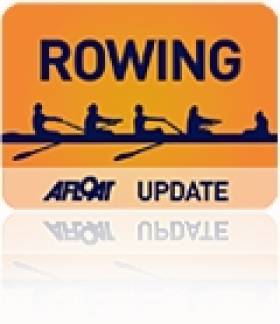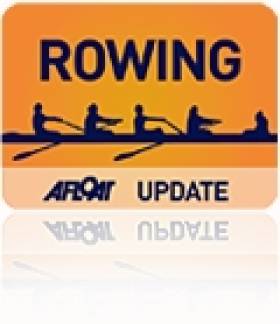Displaying items by tag: Kelly
Portora and McKeown Start Well at Limerick Regatta
#ROWING: Sam McKeown of Portadown won the intermediate single sculls, beating Damien Kelly of Garda, at Limerick Regatta today. The St Michael’s men’s senior pair came out on top and Portora won both the junior 18 and junior 16 men’s eights. Patrick Munnelly of Athlone won the final of the men’s junior 18 single sculls. The event had to be delayed for over an hour because of inclement weather and junior 14 events were cancelled. However, a meeting at the venue decided that the Irish Schools Regatta on Sunday will go ahead.
Limerick Regatta, O’Brien’s Bridge, Selected Results:
Men
Eight – Junior 18: 1 Portora, 2 St Joseph’s, 3 St Michael’s.
Junior 16: 1 Portora, 2 Col Iognáid, 3 St Joseph’s. Masters: St Michael’s.
Four – Senior: 1 Skibbereen, 2 St Michael’s.
Pair – Senior: 1 St Michael’s, 2 Neptune, 3 Shannon.
Sculling – Quadruple – Club Two: 1 Cork B, 2 Shandon, 3 Cork A. Junior 15, coxed, Final One: 1 Shandon A, 2 St Michael’s, 3 Killorglin. Final Two: Castleconnell.
Single – Intermediate: 1 Portadown (S McKeown), 2 Garda (D Kelly), 3 St Michael’s (D O’Connor). Junior 18: 1 Athlone (P Munnelly), 2 Graiguenamanagh (A Lennon), 3 Castleconnell (N Meehan).
Women
Eight – Junior 18: 1 Portora, 2 St Michael’s, 3 Galway.
Sculling, Quadruple – Junior 18: 1 Lee, 2 Fermoy, 3 Offaly.
Double – Junior 15: 1 Workmans, 2 Fermoy, 3 Lee A.
Neptune Rower Aodhan Kelly Hopes to Rule The Atlantic
Kelly is now based in Reading, but he cut his rowing teeth with Neptune Rowing Club in Dublin, and won eight national rowing titles. He was also selected on Ireland teams. Neptune are staging a race-night fundraiser for him in the club on November 12th.






























































